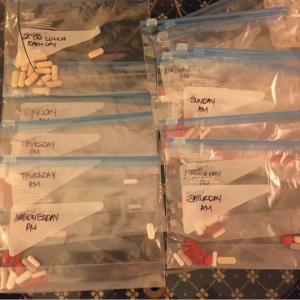After Khloe Kardashian posted a photo of her extensive vitamin pill regimen, the Internet was buzzing over whether that degree of supplementation is appropriate or even safe. I was asked to weigh in on the topic for a Yahoo Health article.
Rather than make a blanket statement about which supplements everyone should or should not be on, I feel it depends on a patient’s individual needs. I had a professor in school who used to say that the only thing a vitamin supplement can “cure” is a deficiency in that vitamin, and I tend to take a similar approach, recommending supplements to address gaps in the diet or to treat underlying deficiencies.
It’s worth noting that it’s possible to overdo it on certain vitamin and mineral supplements, especially if you’re taking various blends with several different things in them. At best, you’ll excrete excess amounts, but GI discomfort and more serious side effects may occur. You also need to be mindful of potential interactions with any medications you may be on. Okay, now I sound like the doom-and-gloom part of an advertisement for a medication.
Though I consider my approach to supplements somewhat conservative, there are a few things I do find myself recommending to most clients:
Vitamin D: Many of us in this northern hemisphere get inadequate sun exposure to synthesize vitamin D, and because there are few naturally occurring food sources, it’s hard to eat enough unless you rely on fortified products (dairy, cereals, etc).
Probiotics: Because so much of our overall health depends on the health of our gastrointestinal tract, promoting good digestion is important. Regularly taking a probiotic supplement populates the GI system with these good bacteria to help keep things running s,monthly (pun intended).
Depending on a person’s needs, I may also recommend fish oil. For my female clients, we often talk about magnesium supplementation to help manage PMS, and occasionally vitamin B-6. Vitamin B-12, calcium, and iron also come up, particularly with someone on a plant-based diet. I’m not quick to recommend multivitamins, but if someone’s eating patterns are erratic or they rarely eat fruits and/or vegetables, it may be appropriate. The one usual exception is prenatal vitamins. Again, it’s case by case, and needs to be based on the whole picture of what’s going on with someone.
Do you take any supplements? Which ones?
